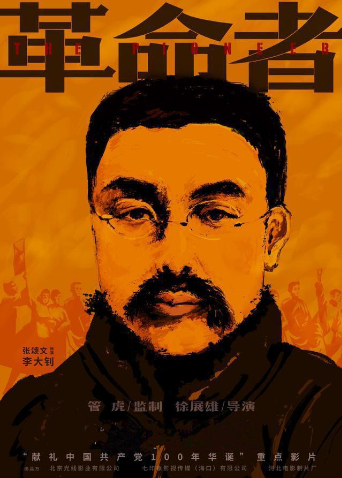只身来到海南复读的老狗(彭昱畅 饰),香蕉结识了一群臭味相投的“咸鱼少年”,香蕉遇见了一群参差不齐的“杂草少女”,缺乏自知之明的他们,要一起参加舞动奇迹大赛。他们迈过偏见与隔阂、战胜自卑和怯懦,放飞青春、肆意起舞,燃过烈日颱风,野遍大街小巷!这个夏天,一起跳舞吧!

只身来到海南复读的老狗(彭昱畅 饰),香蕉结识了一群臭味相投的“咸鱼少年”,香蕉遇见了一群参差不齐的“杂草少女”,缺乏自知之明的他们,要一起参加舞动奇迹大赛。他们迈过偏见与隔阂、战胜自卑和怯懦,放飞青春、肆意起舞,燃过烈日颱风,野遍大街小巷!这个夏天,一起跳舞吧!

回复 :1949年新中国建立以来,虽然人民当家做主人,但是新政权还随时面临被海外敌对势力所颠覆的严峻现状。惨烈的抗美援朝战争结束后,曾经立下赫赫战功的冯石将军(李雪健 饰)接到中央委派的重要使命,那就是主持原子弹的研发工作。虽然对原子弹一窍不通,但是军人出身的冯石只有服从上级的命令,带着一支经过烈火淬炼的英雄部队挺近荒凉的戈壁滩。在此之后,以美国留学归来的陆光达(李幼斌 饰)等科学界的精英人才从四面八方调到了西北荒漠。白手起家,艰苦创业,在内无经验外断支援的艰苦条件下,一群怀着崇高理想的无名男儿朝着共同的目标奋勇前行……
回复 :上世纪50年代,国民党特务组织梅花党在金三角地区设立了特训基地诡城,专门培训精英特工,毕业后分派到世界各地,伺机颠覆社会主义阵营。梅花党将历届特训毕业生的名单记录在了一幅梅花图上,藏在诡城的一间密室里,成为各方势力窃取的目标。随着新一批特训学员的到来,诡城内阴云密布,各色人物轮番登场。是中共特工,还是外国间谍,抑或是梅花党内部的敌对势力,一时间,梅花图引来谍影重重,迷情、闪婚、杀机、对决,纷纷在诡城上演……
回复 :Somewhere in the remote region, the war ends. In the midst of ruined cities and houses in the streets, in rural hamlets, everywhere where people still live, are children who have lost their homes and parents. Abandoned, hungry, and in rags, defenseless and humiliated, they wander through the world. Hunger drives them. Little streams of orphans merge into a river which rushes forward and submerges everything in its path. The children do not know any feeling; they know only the world of their enemies. They fight, steal, struggle for a mouthful of food, and violence is merely a means to get it. A gang led by Cahoun finds a refuge in an abandoned castle and encounters an old composer who has voluntarily retired into solitude from a world of hatred, treason, and crime. How can they find a common ground, how can they become mutual friends? The castle becomes their hiding place but possibly it will also be their first home which they may organize and must defend. But even for this, the price will be very high.To this simple story, the journalist, writer, poet, scriptwriter, movie director, and film theoretician Béla Balázs applied many years of experience. He and the director Géza Radványi created a work which opened a new postwar chapter in Hungarian film. Surprisingly, this film has not lost any of its impact over the years, especially on a profound philosophical level. That is to say, it is not merely a movie about war; it is not important in what location and in what period of time it takes place. It is a story outside of time about the joyless fate of children who pay dearly for the cruel war games of adults.At the time it was premiered, the movie was enthusiastically received by the critics. The main roles were taken by streetwise boys of a children's group who created their roles improvisationally in close contact with a few professional actors, and in the children's acting their own fresh experience of war's turmoil appears to be reflected. At the same time, their performance fits admirably into the mosaic of a very complex movie language. Balázs's influence revealed itself, above all, in the introductory sequences: an air raid on an amusement park, seen in a montage of dramatic situations evoking the last spasms of war, where, undoubtedly, we discern the influence of classical Soviet cinematography. Shooting, the boy's escape, the locomotive's wheels, the shadows of soldiers with submachine guns, the sound of a whistle—the images are linked together in abrupt sequences in which varying shots and expressive sharp sounds are emphasized. A perfectly planned screenplay avoided all elements of sentimentality, time-worn stereotypes of wronged children, romanticism and cheap simplification. The authors succeeded in bridging the perilous dramatic abyss of the metamorphosis of a children's community. Their telling of the story (the scene of pillaging, the assault on the castle, etc) independently introduced some neorealist elements which, at that time, were being propagated in Italy by De Sica, Rossellini, and other film artists. The rebukes of contemporary critics, who called attention to "formalism for its own sake" have been forgotten. The masterly art of cameraman Barnabás Hegyi gives vitality to the poetic images. His angle shots of the children, his composition of scenes in the castle interior, are a living document of the times, and underline the atmosphere and the characters of the protagonists. The success of the picture was also enhanced by the musical art of composer Dénes Buday who, in tense situations, inserted the theme of the Marseilaise into the movie's structure, as a motive of community unification, as an expression of friendship and the possibility of understanding.Valahol Europaban is the first significant postwar Hungarian film. It originated in a relaxed atmosphere, replete with joy and euphoria, and it includes these elements in order to demonstrate the strength of humanism, tolerance, and friendship. It represents a general condemnation of war anywhere in the world, in any form.

